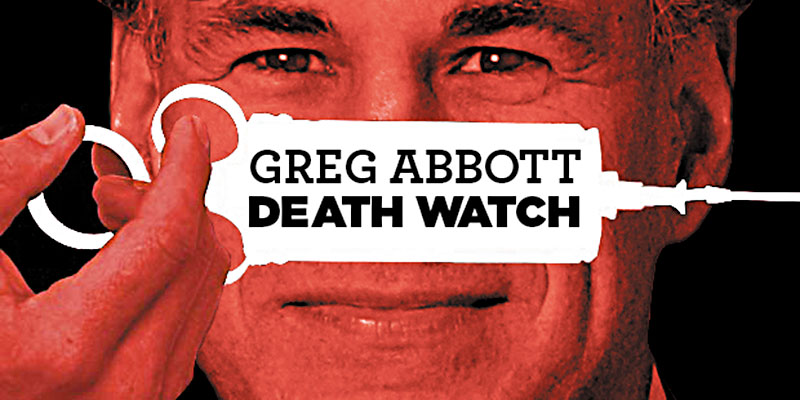Roberson Execution Stayed
Court of Criminal Appeals sends case back to Anderson County
By Chase Hoffberger, 12:10PM, Fri. Jun. 17, 2016
The Texas Court of Criminal Appeals issued a stay on the execution of Robert Roberson Thursday, sending the case back to the Anderson County court where Roberson was initially tried. The 49-year-old was sentenced to death for the 2002 murder of his 2-year-old daughter Nikki Curtis.
Roberson, who is from Palestine, Texas, argued to the state’s highest criminal court on a last ditch effort before his pending June 21 execution that the evidence used to convict him for his daughter’s death was rooted in junk science. The state argued at his trial in 2003 that Nikki died after Roberson shook her – hard enough, prosecutors said, that she slipped into a coma. A jury agreed that Roberson, high on drugs the night that Nikki died, returned her to bed after he shook her, and left her there for hours, until she was unable to be saved.
Roberson always contested those claims. Since the questioning after his arrest, he has maintained that his daughter fell out of her bed. It wasn’t until 2014, when a Houston case exposed new forensic theories on the phenomenon known as “Shaken Baby Syndrome,” that Roberson was able to shift the nature of the effort to save his life from one dependent on his mental state to one centered on the actual facts of his case. A June 8 application for relief filed to the CCA by Office of Capital Writs attorney Gretchen Sween argued that Roberson should be granted a new trial due to the “prior medical understanding” that “a specific set of symptoms” – retinal hemorrhaging, subdural hematoma/hemorrhaging, and brain swelling – “could be viewed together as categorical proof of SBS/AHT,” and because that flawed science resulted in a violation of Roberson’s civil rights to due process.
In an order issued late on Thursday afternoon, the CCA agreed with Roberson’s argument, offering little more than that the justices “find that his claims satisfy the requirements” of Article 11.071 of the Texas Code of Criminal Procedure – that the state relied on false, misleading, and scientifically invalid testimony. The CCA remanded Roberson’s case to the trial court, taking his execution off the docket. The state now has 120 days to file an answer to Roberson’s claims to the CCA.
Roberson’s stay may not be the biggest news to come out of the CCA this week, however. Also on Thursday, in a concurring and dissenting opinion issued in the case of Julius Jerome Murphy, who was convicted in 1998 of killing stranded motorist Jason Erie in Texarkana, Justice Elsa Alcala argued that the remand hearing issued to Murphy should include not just claims that the state withheld evidence that could have spared Murphy, but that the court should consider altogether “whether the death penalty remains a constitutionally acceptable form of punishment under the current Texas scheme.”
The 17-page opinion challenges the tenets of the death penalty on a wide variety of issues. Alcala questions the validity of allowing states to determine health standards for whether someone is too mentally ill to die, lists the vast number of (sometimes arbitrary) possibilities that could elevate a murder charge to capital murder (thus bringing the death penalty into play), the role race typically plays in determining death sentences, and the flaws present in considering whether a convicted Texan could be considered a future threat to society. She notes Murphy’s claims that “the death-penalty scheme is plagued by excessive delays and that this has resulted in cruel and unusual punishment, partly because, throughout this delay, [Murphy] has been held in solitary confinement.”
The opinion is notable for its contents as much as it is for its source. The CCA’s reputation is that of a conservative court, long fundamentally unopposed to the death penalty as a practice. And while Alcala’s opinion represents one solitary voice on a panel of nine justices, it establishes a modicum of concern for whether the death penalty is truly moral.
“I do not decide the ultimate merits of applicant's arguments that the death penalty is unconstitutional, though it should be evident from my numerous opinions on this subject that, in my view, the Texas scheme has some serious deficiencies that have, in the past, caused me great concern about this form of punishment as it exists in Texas today,” Alcala wrote. “Rather than refuse to afford applicant the opportunity to factually develop his complaints as this Court does today, I would instead permit applicant to make an evidentiary record of his assertions and to have the habeas court make findings of fact and conclusions of law.”
Got something to say on the subject? Send a letter to the editor.
A note to readers: Bold and uncensored, The Austin Chronicle has been Austin’s independent news source for over 40 years, expressing the community’s political and environmental concerns and supporting its active cultural scene. Now more than ever, we need your support to continue supplying Austin with independent, free press. If real news is important to you, please consider making a donation of $5, $10 or whatever you can afford, to help keep our journalism on stands.
Sarah Marloff, Nov. 14, 2018
Chase Hoffberger, March 30, 2016
Nov. 16, 2018
Death Watch, Robert Roberson, Elsa Alcala, Julius Murphy, death penalty, capital punishment, Texas Criminal Court of Appeals, Shaken Baby Syndrome











